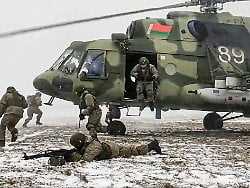Even more soldiers at border
US and NATO deny Russian withdrawal
02/16/2022, 4:30 p.m
The Kremlin’s announcement that it would withdraw troops from the Ukrainian border caused an international sigh of relief. But the US and NATO are finding that the number of soldiers is not decreasing. On the contrary, says NATO Secretary General Stoltenberg in Brussels.
So far, the US government has seen no signs of an end to the Russian troop deployment on the border with Ukraine. US Secretary of State Antony Blinken told MSNBC television that no withdrawal of Russian forces has been observed so far. “They remain gathered in a very menacing manner along the Ukrainian border.” Referring to Moscow’s announcement that troops would be withdrawn, Blinken said: “What Russia says is one thing. What Russia is doing is another.” It would be good “if they put their money where their mouth is, but we haven’t seen that until now”.
Russia surprisingly announced on Tuesday that after maneuvers, troops had begun to be withdrawn from the Ukrainian border. According to NATO findings, Moscow is continuing its troop deployment in the border area, contrary to the announcement. “So far we haven’t seen any de-escalation on the ground. On the contrary: Russia seems to be continuing the military build-up,” said NATO Secretary General Jens Stoltenberg in Brussels on the fringes of a meeting of the defense ministers of the allied states. The Russian Defense Ministry, on the other hand, emphasized that further parts of the troops would be withdrawn.
US President Joe Biden had previously again warned of a Russian invasion of Ukraine. He justified this in a television speech from the White House with the now “more than 150,000” Russian soldiers on the borders with Ukraine. Stoltenberg, on the other hand, repeated the number of “far more than 100,000” Russian troops. But there is an upward trend, he said when asked about Biden’s information.
Test order for international battlegroups
NATO’s stance on Russia is the focus of the two-day meeting of defense ministers from the 30 NATO member states. Another issue is plans to permanently strengthen NATO’s presence on its eastern flank. The NATO Council is expected to give the military leadership under US General Tod Wolters a test order. The establishment of a new multinational combat unit in Romania is under discussion. It could complement the four existing NATO battlegroups in the three Baltic states and in Poland. However, this could lead to additional conflicts with Russia: Moscow has warned the alliance against stationing additional troops in Eastern Europe.
Germany has been leading the multinational NATO battalion in Lithuania for a good five years and has begun deploying 350 additional soldiers. The US also wants to transfer 1,000 soldiers from Bavaria to Romania. France offers to command a future Battlegroup in Romania. NATO decided to set up the multinational battalions in the eastern member states of Poland, Lithuania, Latvia and Estonia in 2016 in response to Russia’s annexation of Crimea in 2014. They are intended to deter Russia from attacking the former Soviet states.
Kiev’s NATO membership: Stoltenberg contradicts Scholz
At the meeting in Brussels, Stoltenberg qualified Chancellor Olaf Scholz’s statements that Ukraine’s accession to NATO was not currently under discussion. It is not Russia that has to decide whether Ukraine wants to join, but rather the 30 NATO countries in consultation with Kiev. It is “the right of every nation in Europe to decide on its own path,” affirmed Stoltenberg. This is an iron principle of NATO and also recorded in the 1975 Helsinki Final Act. The Norwegian had previously repeatedly emphasized that Russia had “no right of veto” on the issue. NATO stands by its decision of 2008 to support Ukraine and Georgia on their way into the military alliance.
At his meeting with Russian President Vladimir Putin in Moscow on Tuesday, Scholz said that Ukraine’s accession to NATO was “not on the agenda”. He underscored that Kiev’s admission to NATO would probably not be decided during either Putin’s or his own term of office. The Russian president is demanding guarantees from the alliance that it will not expand further east. Canadian Defense Minister Anita Anand said in Brussels that NATO “must not deviate from its basic principles” in the conflict with Russia either. The door of NATO must remain open. This applies regardless of the “unprecedented Russian aggression on the Ukrainian border”.
